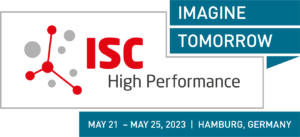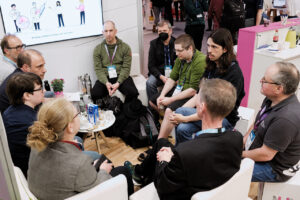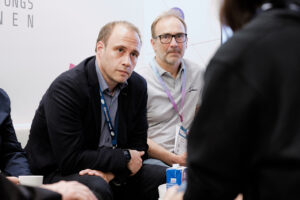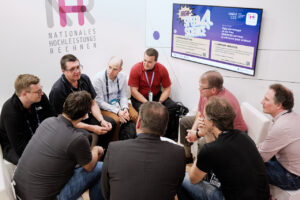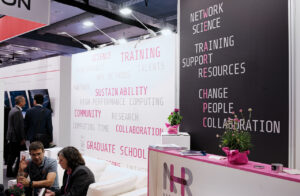It’s been a pleasure being at ISC High Performance 2023 in Hamburg, Germany! This year, we and the other seven NHR centers were part of the NHR Alliance booth. The NHR Alliance was one of 158 exhibitors, with 147 exhibiting onsite. 3.015 participants attended this year’s ISC, setting a new post-pandemic record. ISC 2024 will be held May 12-17 in Hamburg, Germany.
In addition to the booth, we contributed tutorials, paper presentations and our so-called Sofa Talks. We established the Sofa Talks at ISC last year and continued these talks this year. We invited guests to discuss relevant topics with them in a relaxed, personal atmosphere in our Sofa Corner.
Our Activities
On Sunday, Dr. Christian Terboven from our CSG Parallelism and Performance presented the tutorial Advanced OpenMP: Performance and 5.2 Features, which explored the implications of possible OpenMP parallelization strategies, both in terms of correctness and performance. It reviewed the basics of OpenMP programming and discussed language features in-depth, with emphasis on advanced features like vectorization and compute acceleration.
And while Dmytro Povaliaiev was part of the Workshop – HPC I/O in the Data Center – Transfer Learning Workflow for I/O Bandwidth Prediction on Thursday, Marcel Krüger presented the work ”A Case Study on Providing Accessbility-Focused In-Transit Architectures for Neural Network Simulation and Analysis“ at the Workshop on In Situ Visualization (#WOIV). The paper describes how our CSG Visualization provides in-situ/in-transit capabilities for analysis and visualization of simulation data which allows users to get early feedback, steering possibilities and efficient access to analysis and visualization. In addition to presenting the paper, Marcel also participated in the panel discussion with other experts to discuss the future of In Situ solutions.
The Sofa Talks Were a Great Success
On Monday, Dr. Tim Gerrits from our CSG Visualization kicked off the Sofa Talks on the NHR booth. He talked about recent challenges in visualization for HPC with his guests Francois Mazen (Kitware), Dave Pugmire, Michael Böttinger, Jens Henrik Göbbert, Marcel Krüger, Martin Aumüller, James Kress, and Uwe Wössner. In a relaxed atmosphere, the visualization experts discussed various strategies for simplifying access to visualization. New connections were made and the discussions continued beyond this Sofa Talk., Michael Böttinger, Jens Henrik Göbbert, Marcel Krüger, Martin Aumüller, James Kress, and Uwe Wössner. In a relaxed atmosphere, the visualization experts discussed various strategies for simplifying access to visualization. New connections were made, and the discussions continued beyond this Sofa Talk.
Dr. Christian Terboven hosted our second Sofa Talk: NHR: Benchmarks + TCO on Tuesday. While HPL and Stream benchmarks have a long tradition in HPC cluster procurements and acceptance tests, they do not reflect the real-world usage of an HPC cluster that often runs multi-node and/or memory-bound jobs. To evaluate the real value of an HPC system, relevant and real-world applications should be included in the request for proposals. The group discussed current HPC procurement processes in NHR. The goal is to support the corresponding future project in establishing methodologies and best practices for NHR-specific benchmarking and TCO modeling.
OpenMP – What’s There and What’s to Come
Also on tuesday, Christian also participated in the Birds of a Feather (BOF) session titled The OpenMP API v5.2 and v6.0 – What’s There and What’s to Come. Members of the OpenMP language committee – the committee developing the next version of the OpenMP parallel programming standard – presented the active development towards OpenMP 6.0 and were available to answer questions from the audience.
On Wednesday, the last day of the exhibition, Marc-André Hermanns invited his guests to discuss Teaching Advanced MPI, while Dr. Benjamin Juhl – both from our infrastructure team – hosted his Sofa Talk regarding Software licenses in NHR. NHR centers aim to attract users from all of Germany, and provide them with the expertise outlined in the center’s research expertise profile – e.g. atomistic simulations or deep learning. This expertise of course extends to the software stack provided at the NHR clusters. However traditional license agreements for university software have in the past often limited the allowed users to members of that organization. The goal of this sofa talk was to exchange experience with adjusting current license agreements, and discuss requirements for negotiating future license agreements.
We enjoyed the exchange at ISC and look forward to further developments in the HPC world.
Impressions of the ISC
Responsible for the content of this article are Svenja Wimmers, Janin Vreydal and Christian Terboven.


